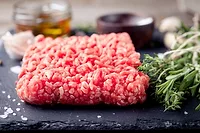Rancho Feeding Co-Owner Pleads Guilty to Selling Meat from Sick Cattle
Source: SFGate.com (text), Barfblog.com (photo)
The co-owner of a shuttered Petaluma, CA slaughterhouse linked to a huge recall pleaded guilty Friday to charges that he helped sell meat from dairy cows with eye cancer and will work with prosecutors in their case against three others in the alleged scheme.
Robert Singleton, 77, of Petaluma entered a guilty plea before U.S. District Judge Charles Breyer in San Francisco to a charge of aiding and abetting in the distribution of adulterated, misbranded and uninspected meat. Singleton is free on $50,000 bond.
Singleton signed an agreement requiring him to cooperate with federal prosecutors trying three other defendants with ties to Rancho Feeding Corp. who were indicted last week on charges of conspiracy to distribute the meat. They allegedly had sick cows' heads severed so inspectors couldn't detect the disease.
In pleading guilty, Singleton "accepts full responsibility for his conduct," said his attorney Pamela Davis. "He acknowledges the harm he's caused to the community."
The case is still pending against Jesse Amaral Jr., the company's president and general manager; Felix Cabrera, the plant foreman who oversaw the "kill floor" where cows were slaughtered; and Eugene Corda, who was responsible for receiving cattle and moving them for inspection and slaughter. All have pleaded not guilty.
The slaughterhouse shut down in February after a recall of 8.7 million pounds of beef — a year's worth of meat that had been processed from diseased animals without a full federal inspection, authorities said.
Looking for quick answers on food safety topics?
Try Ask FSM, our new smart AI search tool.
Ask FSM →
From 2012 to this year, Amaral directed employees to process cattle that had already been condemned by a U.S. Department of Agriculture veterinarian, the indictment said. Cabrera then allegedly told "kill floor" employees to carve the "USDA Condemned" out of the carcasses.
Amaral also directed Cabrera and Corda to circumvent inspection procedures for certain cows with signs of epithelioma, also known as "cancer eye," authorities said.
Corda swapped in cows that had signs of the cancer, but had not been inspected, for cattle that had already passed inspection and were awaiting slaughter, the indictment said. Cabrera, authorities said, then "placed heads from apparently healthy cows" next to the cow carcasses linked to the cancer.
This happened while federal meat inspectors were on their lunch break, investigators said.
Since the start of 2013, the plant processed and distributed meat from 101 condemned cattle and 79 cows that had been infected with eye cancer, the indictment said.






